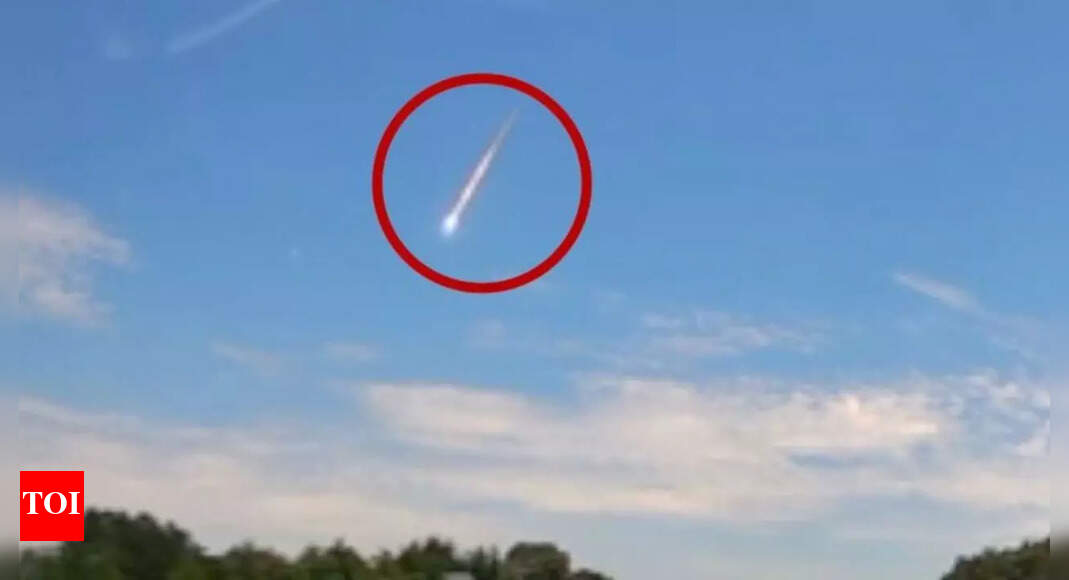
Fireball comet seen streaking across sky over Southeastern US, reportedly crashes into Georgia home | – The Times of India
How did your country report this? Share your view in the comments.
Diverging Reports Breakdown
Fireball comet seen streaking across sky over Southeastern US, reportedly crashes into Georgia home
A bright fireball meteor streaked across the Southeast US sky around midday on June 26, 2025. Witnesses described the fireball as unexpectedly bright and fast, creating a loud boom that was heard across multiple states. The dramatic display was soon linked to a suspected meteor crash in Henry County, Georgia, where debris reportedly damaged a residential home. If confirmed as a meteorite impact, it could mark one of the rare occasions where a meteor has struck a building in the United States. The American Meteor Society continues to collect eyewitness accounts, images, and videos to reconstruct the event. Although most meteors burn up harmlessly in the atmosphere, this incident, possibly involving a meteor crashing into a home, shows that rare but impactful encounters can happen.
Meteor crash triggers sudden flash and boom across the sky
Residential damage in Georgia sparks investigation
No earthquake detected, but boom felt region-wide
What exactly is a fireball meteor?
Scientists continue to analyse the event
A bright fireball meteor streaked across the Southeast US sky around midday on June 26, 2025, startling residents in Georgia , South Carolina, North Carolina, and Tennessee. More than 140 reports were submitted to the American Meteor Society within 30 minutes, describing a sudden flash followed by a loud boom. In Henry County, Georgia, officials confirmed damage to a home where the meteor is believed to have crashed through the roof, scattering rocky debris inside. The explosive sound triggered widespread confusion, with many mistaking it for seismic activity. The rare daytime meteor became a regional spectacle within moments.At around noon, social media exploded with posts and videos showing a blazing object racing across the sky. Witnesses described the fireball as unexpectedly bright and fast, creating a loud boom that was heard across multiple states. Dashcam footage from South Carolina captured the object streaking through clear blue skies, while satellite data revealed a smoke trail that extended from Tennessee into northern Georgia. The dramatic display was soon linked to a suspected meteor crash in Henry County, Georgia, where debris reportedly damaged a residential home.According to fox News, In Henry County, southeast of Atlanta, a homeowner reported significant structural damage, with authorities confirming a hole in the roof and ceiling likely caused by falling meteor debris. Images shared by emergency management officials show shattered roofing materials and scattered rocks on the home’s floor, intensifying speculation that the fireball made a direct impact.Following the explosion-like sound, the National Weather Service in Atlanta began investigating whether seismic activity had occurred. However, the US Geological Survey found no evidence of an earthquake at the time, suggesting the boom was atmospheric in origin—likely the meteor entering and breaking apart in the atmosphere.Fireballs are exceptionally bright meteors, often brighter than Venus in the night sky. When these meteors explode mid-air with visible fragmentation, they are known as bolides. Thursday’s fireball fits this description, with a flash so intense it was picked up by NOAA’s Geostationary Lightning Mapper, typically used to monitor lightning storms.Astronomers and meteorite experts are now working to determine the exact nature and trajectory of the fireball. If confirmed as a meteorite impact, it could mark one of the rare occasions where a meteor has struck a building in the United States. The American Meteor Society continues to collect eyewitness accounts, images, and videos to reconstruct the event.The fireball event is a powerful reminder of Earth’s vulnerability to space debris. Although most meteors burn up harmlessly in the atmosphere, this incident, possibly involving a meteor crashing into a home, shows that rare but impactful encounters can happen. Thankfully, no one was injured, but the damage highlights the importance of monitoring near-Earth objects and improving our understanding of atmospheric entry events. It’s a vivid example of how space, though distant, can occasionally and unexpectedly reach into our everyday lives.
